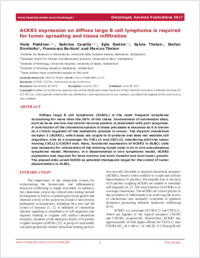ACKR3 expression on diffuse large B cell lymphoma is required for tumor spreading and tissue infiltration
- Puddinu, Viola Institute for Research in Biomedicine (IRB), Faculty of Biomedical Sciences, Università della Svizzera italiana, Switzerland - Graduate School for Cellular and Biomedical Sciences, University of Bern, Switzerland
- Casella, Sabrina Institute for Research in Biomedicine (IRB), Faculty of Biomedical Sciences, Università della Svizzera italiana, Switzerland - Graduate School for Cellular and Biomedical Sciences, University of Bern, Switzerland
- Radice, Egle Institute for Research in Biomedicine (IRB), Faculty of Biomedical Sciences, Università della Svizzera italiana, Switzerland - Graduate School for Cellular and Biomedical Sciences, University of Bern, Switzerland
- Thelen, Sylvia Institute for Research in Biomedicine (IRB), Faculty of Biomedical Sciences, Università della Svizzera italiana, Switzerland
- Dirnhofer, Stefan Institute of Pathology, University Hospital, University of Basel, Switzerland
- Bertoni, Francesco Institute of Oncology Research (IOR), Faculty of Biomedical Sciences, Università della Svizzera italiana, Switzerland
- Thelen, Marcus Institute for Research in Biomedicine (IRB), Faculty of Biomedical Sciences, Università della Svizzera italiana, Switzerland
-
29.06.2017
Published in:
- Oncotarget. - 2017, vol. 8, no. 49, p. 85068-85084
English
Diffuse large B cell lymphoma (DLBCL) is the most frequent lymphoma accounting for more than the 30% of the cases. Involvement of extranodal sites, such as bone marrow and central nervous system, is associated with poor prognosis. A contribution of the chemokine system in these processes is assumed as it is known as a critical regulator of the metastatic process in cancer. The atypical chemokine receptor 3 (ACKR3), which does not couple to G-proteins and does not mediate cell migration, acts as a scavenger for CXCL11 and CXCL12, interfering with the tumor homing CXCL12/CXCR4 axis. Here, functional expression of ACKR3 in DLBCL cells was necessary for colonization of the draining lymph node in an in vivo subcutaneous lymphoma model. Moreover, in a disseminated in vivo lymphoma model, ACKR3 expression was required for bone marrow and brain invasion and local tumor growth. The present data unveil ACKR3 as potential therapeutic target for the control of tumor dissemination in DLBCL.
- Language
-
- English
- Classification
- Medicine
- License
-
License undefined
- Open access status
- green
- Identifiers
-
- RERO DOC 324217
- DOI 10.18632/oncotarget.18844
- ARK ark:/12658/srd1318971
- Persistent URL
- https://n2t.net/ark:/12658/srd1318971
Statistics
Document views: 199
File downloads:
- Texte intégral: 132
